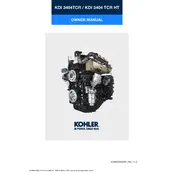Kohler KDI-3404TCR HT Owner's Manual


Regular maintenance tasks include checking and replacing the engine oil, inspecting and cleaning the air filter, checking the coolant level, and inspecting the fuel system for leaks. It's also important to inspect the belts and hoses for wear and tear.
First, ensure the battery is fully charged and the connections are clean and tight. Check the fuel supply for any obstructions and ensure the fuel filter is clean. Inspect the glow plugs and starter motor for proper operation.
Kohler recommends using a high-quality, diesel engine oil that meets API CJ-4 or higher specifications. The viscosity grade should match the ambient temperature conditions.
To improve fuel efficiency, ensure that the air filter is clean, maintain the correct tire pressure if applicable, use the recommended grade of oil, and avoid idling the engine for long periods. Regular maintenance is key to optimal performance.
First, shut down the engine immediately to prevent damage. Check the coolant level and refill if necessary. Inspect the radiator for blockages and ensure the cooling fan is operating correctly. Consult a professional if the issue persists.
To replace the air filter, first remove the air filter cover. Take out the old filter and clean the housing. Insert the new air filter and ensure it is seated properly. Reattach the air filter cover securely.
The fuel filter should be changed every 500 hours of operation or as specified in the engine's maintenance schedule. Regular inspection for contaminants is also advised.
Yes, the Kohler KDI-3404TCR HT engine can run on biodiesel blends up to B20. Ensure that the biodiesel meets the appropriate standards and consult the engine manual for specific guidelines.
To perform a compression test, first disable the fuel system and remove the glow plugs. Install the compression gauge and crank the engine for a few seconds. Compare the readings to the manufacturer's specifications to assess engine condition.
Signs of a failing turbocharger include excessive exhaust smoke, loss of power, unusual noises from the turbo, and increased oil consumption. If you notice these symptoms, have the turbocharger inspected by a professional.